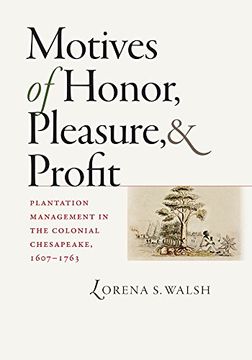Compartir
Motives of Honor, Pleasure, and Profit: Plantation Management in the Colonial Chesapeake, 1607-1763 (Published for the Omohundro Institute of Early. History and Culture, Williamsburg, Virginia) (en Inglés)
Lorena S. Walsh (Autor)
·
Univ Of North Carolina Pr
· Tapa Dura
Motives of Honor, Pleasure, and Profit: Plantation Management in the Colonial Chesapeake, 1607-1763 (Published for the Omohundro Institute of Early. History and Culture, Williamsburg, Virginia) (en Inglés) - Lorena S. Walsh
S/ 460,18
S/ 920,37
Ahorras: S/ 460,18
Elige la lista en la que quieres agregar tu producto o crea una nueva lista
✓ Producto agregado correctamente a la lista de deseos.
Ir a Mis Listas
Origen: Estados Unidos
(Costos de importación incluídos en el precio)
Se enviará desde nuestra bodega entre el
Lunes 17 de Junio y el
Lunes 01 de Julio.
Lo recibirás en cualquier lugar de Perú entre 2 y 5 días hábiles luego del envío.
Reseña del libro "Motives of Honor, Pleasure, and Profit: Plantation Management in the Colonial Chesapeake, 1607-1763 (Published for the Omohundro Institute of Early. History and Culture, Williamsburg, Virginia) (en Inglés)"
This is the most complete picture yet of the early plantation economy. Lorena Walsh offers an enlightening history of plantation management in the Chesapeake colonies of Virginia and Maryland, ranging from the founding of Jamestown to the close of the Seven Years' War and the end of the ""Golden Age"" of colonial Chesapeake agriculture. Walsh focuses on the operation of more than thirty individual plantations and on the decisions that large planters made about how they would run their farms. She argues that, in the mid-seventeenth century, Chesapeake planter elites deliberately chose to embrace slavery. Prior to 1763 the primary reason for large planters' debt was their purchase of capital assets - especially slaves - early in their careers. In the later stages of their careers, chronic indebtedness was rare. Walsh's narrative incorporates stories about the planters themselves, including family dynamics and relationships with enslaved workers. Accounts of personal and family fortunes among the privileged minority and the less well documented accounts of the suffering, resistance, and occasional minor victories of the enslaved workers add a personal dimension to more concrete measures of planter success or failure.

